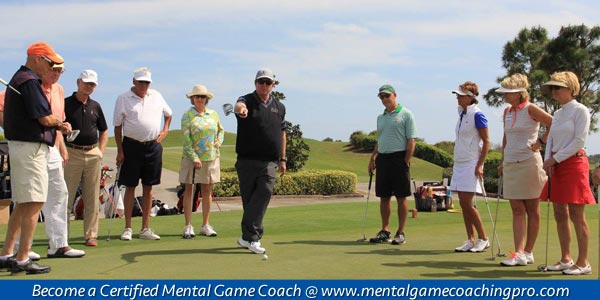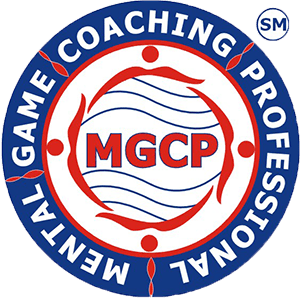
Four Phases Of Mental Training
Starting a career as a mental coach, the first golfer I worked with said the following about the problems with improving his mental game:
“When you have a problem with the swing, I can go the range and work on drills to improve my swing. But if I have a problem with my mental game, I don’t know what drills to work on.”
I knew that this issue was going to hinder my success as a mental game coach unless I did something about it….
This golfer was a hometown friend named E.J. Pfister from East Aurora, New York who won the NCAA Division I Individual Golf Championship in 1988.
Shortly after winning the NCAA Championship, he turned pro and won the New York State Open and later qualified to play on the PGA Tour.
The year E.J. won the state open, I caddied for him and witnessed, “inside the ropes,” how important the mental game was to success.
I considered this to be part of my education as a mental coach.
Back to E.J.’s point… One of the big barriers to success for mental coaches is how to make the mental game more concrete or less abstract for athletes…
Many athletes view the mental game as intangible, which makes it harder for them to know how to improve the mental game or even know for certain what they need to improve.
In the MGCP course, I teach the four phases of mental training with athletes.
These are:
- Awareness
- Education
- Practice
- Application
In order to make the mental game more tangible for athletes, you MUST cover all four of these phases of mental training.
If athletes are unaware of their mental game strengths and weaknesses, you can’t build a mental game plan for them.
Once you help athletes become aware of their mental game, the education step is straightforward. You simply teach mental skills they can understand given their age.
But the REAL learning or behavior change happens when your athletes know how to integrate mental skills training into practice and competition…
This is how you make the mental game more tangible and less abstract for athletes.
For example, you can easily teach athletes how to refocus when distracted, right? But can they apply refocusing to practice everyday and eventually to competition?
To me, this is critical for your athletes’ success:
The ability to help your athletes integrate the lessons they learn into their regular practice and competition.
If your athletes can’t do this–when it counts–in competition, have they really made any changes?
Your success as a mental coach depends on this step in the phases of mental training.
The more they understand how to apply and practice the mental game, they better their results and the more successful you can become.
When I started working with E.J., I didn’t have a clue about how to help him with the “drills” to improve his mental game.
After nearly 30 years of working with athletes to help them improve the mental game, I now understand how important these “drills” are to athletes’ success.
And you learn everything I know in the MGCP course this summer. If you know anyone that’s enrolled in the course, he or she will tell you that I hold nothing back..
You get my complete system for helping athletes improve their mental game–the exact same system I use today.
And you learn how to bridge the gap between education and application so your athletes can learn the “drills” to make the mental game more tangible.
Related Mental Coaching Articles
- One Way to Have Credibility as a Mental Game Coach
- How I Started In Sports Psychology
- 5 Challenges for Sports Psychology Experts
Mental Coach Assessment System

If you help athletes improve their mental game and want to be more effective with helping them build mental toughness, but don’t have a proven system for identifying and assessing your athletes’ mental game, I can help you…
I view this assessment as a way to “interview” athletes before they come in for coaching–and to improve organization and speed up the coaching process. Today, I call it the Athlete’s Mental Aptitude Profile or AMAP for short. Now you too can learn how to use the AMAP Assessment system with your athletes…
The AMAP System teaches you how to easily identify your athletes’ mental game challenges, what mental game issues to look for when reading the AMAP, and how to do a summary of the AMAP. In addition, you’ll also get follow up questions to ask and how learn about how to drill down on relevant topics.
